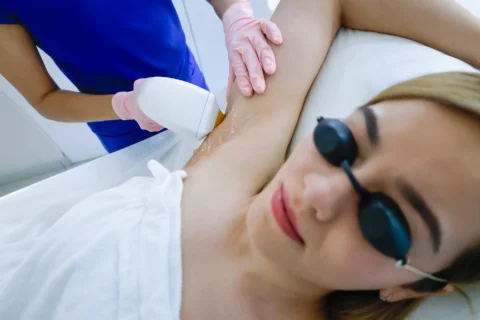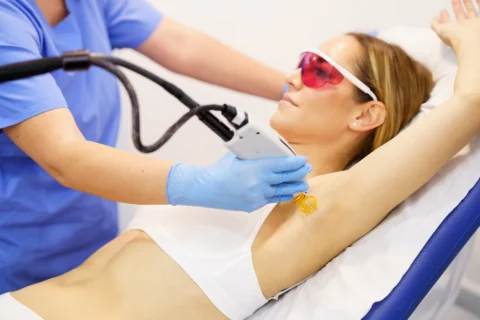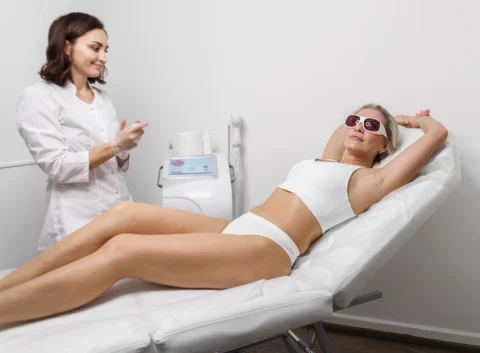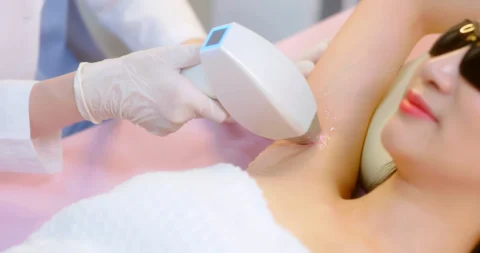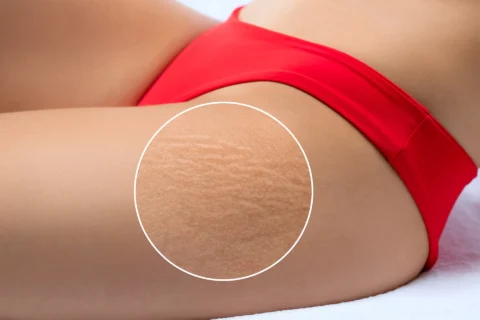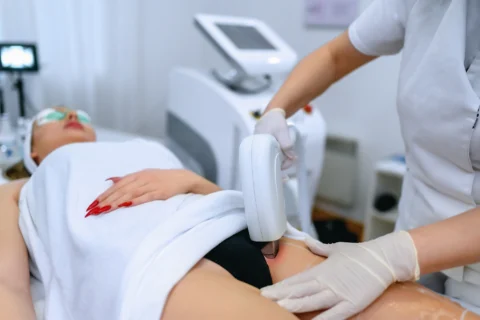Polycystic Ovary Syndrome (PCOS) is a condition that causes hormonal imbalance in women, making them produce more male hormones than usual. One of its most evident symptoms is hirsutism, an increased hair growth in the face or body. An increasing number of women try to treat this condition with laser hair removal. But a common question we get is, “Will laser hair removal work if I have PCOS?”
So, is laser hair removal really the most effective treatment against excessive hair growth from PCOS? Yes! Many women with PCOS go through consecutive procedures every year and most have experienced around 90% of reduction in hair growth. The sessions are also more affordable and take less time to complete compared to other treatments like electrolysis.
Using Laser Hair Removal for PCOS Hair Growth
How exactly does the laser hair removal treatment work to efficiently treat the hair growth from polycystic ovary syndrome? Laser sessions use highly concentrated beams to destroy hair follicles underneath the skin. To truly reduce hair growth in any part of the body, doctors usually recommend around 10-12 sessions of laser procedures, and 12 or more if the hair being removed is on the face.
It is important to note that laser removal does not result in permanent removal in the treated area. The damaged hair follicles will stop allowing hair to grow for several months (and in some cases, a few years), but eventually the body repairs damaged hair follicles, leading to a return of hair growth.
However, any hair that grows is usually softer and finer than before, and these follicles can be treated with maintenance laser sessions. Maintenance sessions every 12-15 weeks are necessary to yield longer lasting results from laser procedures.
5 Reasons Why Laser Hair Removal is the Ideal Solution for PCOS
- Semi-Permanent Hair Removal: While many people tout laser hair removal as a permanent hair removal solution, it is better to think of it as a semi-permanent hair solution. Patients can generally expect a 90% reduction in hair growth in the treated area, and these results can last as long as necessary with maintenance treatments.
- Quick, Simple, and Easy: With only 10-12 short sessions, laser is clearly an easy solution to the difficult problem of excessive facial or body hair. It is also considerably less expensive and painful than electrolysis, which is another procedure that yields long lasting results.
- Few Restrictions and Limitations: Patients with PCOS need to consult with a medical professional to determine their suitability. Once the medical professional clears them, procedures can begin as soon as possible.
- Zero Recovery and Downtime: The procedure does not result in any lasting pains to patients. They can go about their normal activities as long as they don’t expose themselves to too much sunlight at least 6 weeks after the procedure.
- Better Than Other Solutions: There are several other treatments known for dealing with excessive hair growth from PCOS. However, in comparison, laser hair removal proves to be the best especially when it comes to convenience.
Alternative Treatments for PCOS Laser Solutions
Here are some of the other common treatments that may work for PCOS:
- Shaving: This classic method of removing hair is the easiest and cheapest because you may do it yourself at home.
- Waxing: This method plucks the hair follicles directly, which means the hair will grow back for as long as a month before you need to wax again.
- Vaniqa: This brand of eflornithine cream is used to slow down facial hair growth, especially in the chin area. However, it cannot be applied to other parts of the body.
- Spironolactone: This medication may block testosterone in the body, which stops hair growth. It must be taken with birth control pills to avoid negative effects on the patient’s reproductive system.
- Electrolysis: This procedure puts a permanent stop to a patient’s hair growth because it destroys the root of the hair completely using radio frequency technology.
Advantage of Laser Hair Removal Over Other Treatments
| NECESSARY MAINTENANCE | LASTING RESULTS | PAIN | |
| Shaving | Daily/Weekly | No | Low |
| Waxing | Monthly | No | Mild to High |
| Vaniqa | Twice a day for 6 months | No | None |
| Spinorolactone | Once or twice a day for 6-12 months | No | None |
| Electrolysis | 15-40 treatments | Yes | High |
| Laser Hair Removal | 10-12 treatments (with follow-up sessions every 12-15 weeks) | Yes | Mild |
Out of all the procedures listed above, the two with the clearest lasting results are electrolysis and laser hair removal. However, laser treatment is the preferred option for most patients due to its convenience, as it requires fewer sessions than electrolysis. It is also a less painful treatment than electrolysis, and each session takes less time to do as well.
With less maintenance, lower levels of pain, and longer lasting results, the laser procedure is clearly the ideal treatment option for women experiencing PCOS.
The Laser Hair Removal Experience
So what can patients with PCOS expect during their laser procedure experience? Here’s a breakdown of what you can expect:
Preparation
You must consult with a medical professional to determine if you are a proper candidate for the procedure. Once the medical professional clears you for the procedure, take note of the following reminders:
- Exposure to the sun six weeks before the first session must be limited.
- Waxing and plucking must be avoided before treatment. It is important to keep the follicles because the lasers will target them. However, it is recommended that you trim or shave the area that will be treated before sessions begin.
Laser Hair Removal Sessions
3-5 sessions will be done at short intervals over the course of 4 weeks. Follow-up sessions will be determined with the practitioner in charge of your treatment. For the face, at least 12 or more sessions are required. For any other area in the body, at least 10-12 sessions are needed.
Post-Procedure and Recovery
Patients who undergo hair removal will have extremely sensitive skin for the next few days, and the treated area will continue being slightly sensitive for 3-4 weeks after the procedure. Patients should:
- Limit direct exposure to the sun
- Always use sunblock when going outside
- Avoid strenuous activity for a few days after each procedure
- Avoid shaving or waxing their hair before every appointment
- Make sure to show up for every session as scheduled
Book your Laser Hair Removal Consultation at Ethos Spa Today
If you have questions about laser hair removal or would like to know more about treating PCOS, book your free consultation at Ethos Spa today. We are the premier destination for laser hair treatments in New Jersey and we have helped countless women with PCOS for years.


